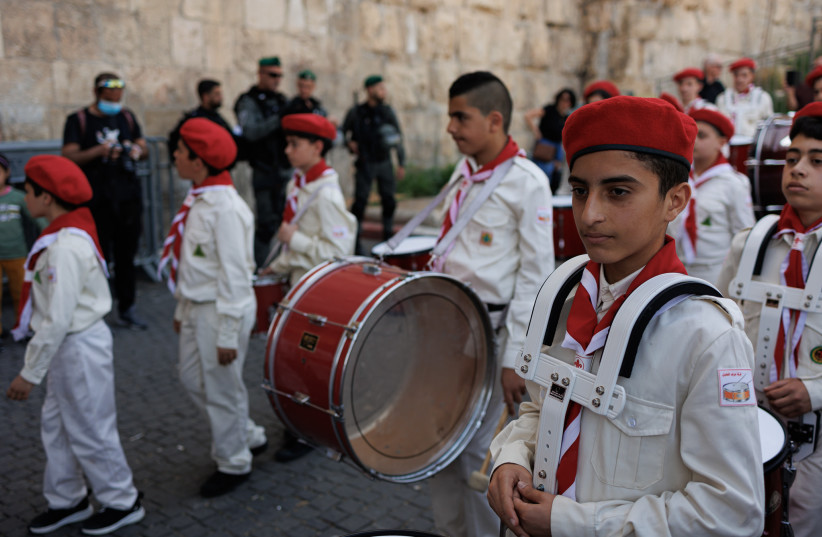Palm Sunday began slowly, but the annual walk from Mount of Olives down to the Old City of Jerusalem still attracted thousands of believers.
For more stories from The Media Line go to themedialine.org
On the morning of April 10, Western Christianity’s Palm Sunday, things were quiet in Jerusalem. Church bells rang down the nearly empty streets as a few Palestinian Christian families walked to church in their Sunday best. Shops slowly opened a bit later than usual due to Ramadan fasting, a shop owner told The Media Line.
Palm Sunday usually brings crowds of worshipers through the Old City, but this year felt different. A shop owner who has been selling for 25 years was hopeful the city would become busier as the day progressed.
Of course, most Palestinian Christians are followers of Eastern, or Orthodox, Christianity, and this year they will celebrate Palm Sunday on April 17.
Another shop owner told The Media Line that they usually see heavy tourism from Eastern Europe during Holy Week. Russian, Ukrainian and Polish Eastern Orthodox travel to Jerusalem to walk the same streets Jesus walked, as their religion believes, on Palm Sunday. The shop owner thought the heightened security in Jerusalem was not deterring Christian tourists, but that the war in Ukraine contributed to the decline in tourism.

“Jerusalem is safe,” he said.
Spectators waiting for the Palm Sunday procession outside the Old City’s Lions’ Gate, also known as St. Stephen’s Gate, where the Via Dolorosa begins, told The Media Line there were usually many more people.
One of the attendees, a dentist from Ramallah, said the decline in tourism was due to a variety of factors: COVID-19, economics, the war in Ukraine, heightened tension in Jerusalem, and Ramadan all falling at the same time. The dentist was accompanied by her mother, in town from New York, and a friend from Sweden.
Another spectator told The Media Line there were worries of an “empty procession.” He was surprised when floods of people began walking toward the gate with palms in hand.
With ample security surrounding the area, the procession marched up the hill to Lions’ Gate. The procession began with bands from local schools, continued with tourists from around the world singing praises in their native tongues, and concluded with the Latin patriarch of Jerusalem, Pierbattista Pizzaballa. It was a beautiful celebration under the harsh sun.
A manager at the Prima Royale Hotel, Fawaz Shaaban, told The Media Line that tourism is picking back up post-COVID. Their 133 rooms will be fully booked for Passover, which begins on Friday evening.
“People are thirsty for the Holy Land; they want to drink from its waters,” he said.
Most of the tourists at the hotel now are from South America, but during the week of Passover it will be full of Jewish groups, with one or two Christian groups as well, Shaaban said. Regardless of the lean crowds in the Old City on Sunday, people seemed relaxed. The recent tensions from terror attacks, security forces raids, and clashes did not seem to concern those in attendance.
Crystal Dunlap is an intern in The Media Line’s Press and Policy Student Program.
